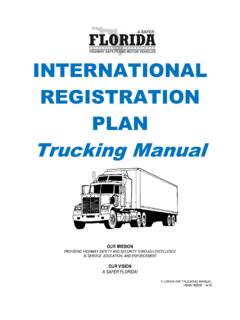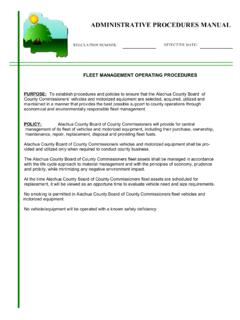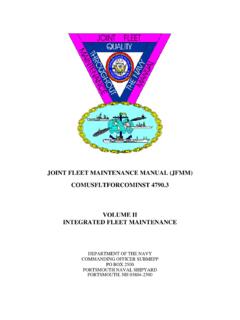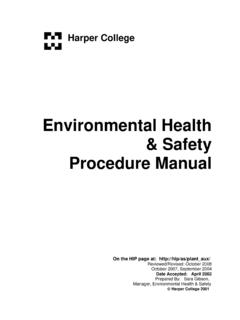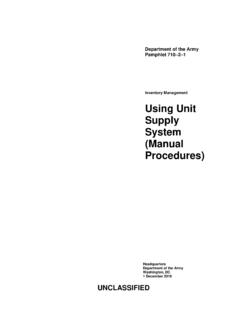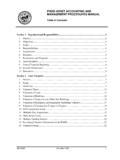Transcription of FLEET MANAGEMENT POLICIES AND PROCEDURES
1 FLEET MANAGEMENT . POLICIES AND. PROCEDURES . Procurement and Contract Services November 8, 2010. FLEET MANAGEMENT . POLICIES AND PROCEDURES . TABLE OF CONTENTS. Section I: General Provisions A. Statement of Purpose ..1. B. C. Section II: MANAGEMENT A. B. Vice President ..1. C. Procurement and Contract Services ..1. D. Physical E. F. Vehicle Section III: Acquiring University Owned Vehicles A. Decision Process ..2. B. Purchasing C. Receipt of a Newly Acquired University Vehicle ..4. D. Record Keeping Requirements ..4. E. Insurance ..5. Section IV: Vehicle Use Policy A. General POLICIES and Guidelines ..7. B. Authorized C. Misuse of Southern Miss Owned Section V: Maintenance and Care of University Owned Vehicles A. B. Vehicle Warranty C. Vehicle Checks ..14. D. State Inspection E. Safety F. Small Repairs ..15. G. Emergency H. Vehicle I. Vehicle Appearance ..15. J. K. Fuel ..15. L. Section VI: Vehicle Rentals A. Vehicle Rental Approved November 8, 2010 i FLEET MANAGEMENT . POLICIES AND PROCEDURES .
2 Section VII: Privately Owned Vehicles A. Authorization ..17. B. Insurance ..18. C. Expense ..18. D. Safety ..18. Section VIII: Replacement/Disposal of University Owned Vehicles A. Replacement Suggestions ..18. B. Disposition of Appendix A: Vehicle Use Agreement ..20. Appendix B: Vehicle Trip Log ..21. Appendix C: Request for Additional Appendix D: IHL Van Safety Recommendations ..23. Appendix E: Driver Inspection Checklist ..26. ii Approved November 8, 2010. FLEET MANAGEMENT . POLICIES AND PROCEDURES . Section I: General Provisions A. Statement of Purpose: The purpose of this FLEET manual is to provide information governing the administrative POLICIES and PROCEDURES for the purchase, operation, maintenance and disposal of university owned vehicles as mandated by the State of Mississippi, Mississippi Board of Trustees of State Institutions of Higher Learning (IHL) and The University of Southern Mississippi (Southern Miss). This document exists to promote the safe, legal, and responsible use of vehicles owned or operated for the benefit of Southern Miss.
3 The protection of life, property, and the good stewardship of public resources is at stake. B. Application: These POLICIES and PROCEDURES apply to any and all vehicles owned by or used for the benefit of Southern Miss that are licensed for travel on public roads. This includes all such vehicles regardless of funding source or method of acquisition. C. Enforcement/Consequences: The President and all Vice Presidents have reviewed and endorse the FLEET MANAGEMENT POLICIES and PROCEDURES , including the Vehicle Use Agreement and Fuelman guidelines. The Vice Presidents will be responsible for enforcement of these POLICIES and PROCEDURES and shall apply appropriate consequences for failure to comply. Such consequences could range from required training to reduced driving capabilities and may go as far as termination of employment. The degree of consequences shall be based upon the potential risk to life and property. Driving a university owned vehicle is a privilege and the university reserves the right to deny or revoke the driving privileges of any driver in the event that driver does not meet the requirements set forth in this policy.
4 Section II: MANAGEMENT A. Executive: As mandated by IHL, no department shall purchase, rent, lease or acquire any motor vehicle, regardless of the funds from which the motor vehicle is to be purchased, except under authority granted by the President. Authority shall only be granted to purchase, rent, lease or acquire a motor vehicle which is the lowest cost vehicle to carry out its intended use. (This policy excludes the rental of vehicles from the state contract provider covered by the university's travel POLICIES .). B. Vice President: Each Vice President will be responsible for allocating vehicle resources in the most cost effective and efficient manner. They could choose to create a department motor pool wherein vehicles will be checked out on an as needed basis or they may choose to assign specific vehicles to specific individuals or they may choose a combination of the two. The idea should be that the Vice President has the flexibility to assign the vehicles as they see fit while maximizing the use of the available resources.
5 C. Procurement and Contract Services: Procurement and Contract Services will administer the university's Fuelman program, maintain a list of all vehicle administrators and provide training as necessary. Procurement and Contract Services will also maintain the FLEET MANAGEMENT POLICIES and PROCEDURES manual . Approved November 8, 2010 1. FLEET MANAGEMENT . POLICIES AND PROCEDURES . D. Physical Plant: Physical Plant will be responsible for obtaining titles, tags, ensuring that all vehicles are marked appropriately and that all vehicles owned by Southern Miss are added to the university's FLEET liability policy. E. Department: Individual university departments that have vehicles listed on their inventory are responsible for their assignment and use in compliance with all university POLICIES and PROCEDURES . The department carries the fiscal responsibility for the proper maintenance and upkeep for any and all vehicles listed on their inventory. The department will also be responsible for assigning Vehicle Administrators.
6 1. For each vehicle owned by Southern Miss, a Vehicle Administrator shall be named. The name and contact information for this individual shall be on file at the department with a copy on file with Procurement and Contract Services. A department may have one Vehicle Administrator responsible for its entire FLEET or they may choose to assign each vehicle a different Vehicle Administrator. The basis for this requirement is that unless someone is named as the responsible party, in most cases, nobody will be responsible. Procurement and Contract Services will provide training to Vehicle Administrators. F. Vehicle Administrator: Because the university does not operate a central motor pool, all daily vehicle operational functions are the responsibility of the department which operates a university owned vehicle. To accomplish this, each department must identify a specific employee, the Vehicle Administrator, who is responsible for the following functions: 1. Assures vehicle(s) receives appropriate service and in general, is maintained in a safe operating condition.
7 2. Monitors assignments of vehicles, usage and in general assures compliance with this FLEET manual . 3. Maintains the department Authorized Driver List and ensures each driver has a current, signed Vehicle Use Agreement (Appendix A). 4. Maintains records as outlined in this FLEET manual . 5. Ensures the appropriate appearance of the vehicle(s). Section III: Acquiring University Owned Vehicles A. Decision Process: The purchase decision should be carefully considered. These guidelines are not intended to stop any department from purchasing a required vehicle but are intended to point out instances where the decision to purchase may not be the best use of the tax and tuition dollar. The following are general guidelines that should be considered: 2 Approved November 8, 2010. FLEET MANAGEMENT . POLICIES AND PROCEDURES . 1. In most instances, if an individual is traveling less than 15,000 miles per year (in a passenger type vehicle) it is possibly more economical for the department to have the employee drive his/her personal vehicle and have the department reimburse at the current mileage rate.
8 Another option would be to develop a pool whereby low mileage users would have access to an appropriate vehicle. 2. In many instances where transportation of dignitaries or other officials is required on a non- regular basis, it may be better to rent a full size vehicle or passenger van for those specific occurrences, rather than purchasing the vehicle and not fully utilizing its capabilities. 3. A full size vehicle does not get great gas mileage and has a higher cost when compared to a mid size or intermediate size vehicle; therefore, full size vehicles would not be the appropriate vehicle to purchase if the intended use is to transport a driver only and occasionally three or fewer passengers to and from appointments, meetings, etc. Requests for full size vehicles must include detailed explanation of the need for the increased size (carrying capacity, towing responsibility, etc). 4. Utility vehicles do not get good gas mileage and have much higher costs when compared to other passenger type vehicles, vans, and pickup trucks; therefore, there are very few situations where a utility vehicle would be the most appropriate vehicle.
9 Transportation of passengers and equipment can normally be accomplished with a passenger van or sedan. Requests for utility vehicles must include a detailed explanation for the need of this type of vehicle. 5. Large pickup trucks (3/4 ton and 1 ton) have much higher purchase and maintenance costs (fuel, etc.) and are not appropriate when a smaller vehicle will meet the needs of the department. Requests for larger trucks should include adequate explanation of the need for the increased size (carrying capacity, towing responsibility, etc). B. Purchasing Process: Vehicles may be purchased with departmental funds in accordance with university and state purchasing POLICIES and PROCEDURES with the approval from the university's executive officer. Approved methods of acquisition include purchasing from the state contract vendors, interdepartmental or interagency transfer, state surplus property or purchase from an approved auction. 1. The department or budget unit shall develop a detailed description of the vehicle.
10 Information on state contract vehicles is available on the Office of Purchasing and Travel website: , click on Vehicles. 2. A justification of vehicle need shall be developed. The justification must state whether the vehicle is an addition to the current number of vehicles on the departmental inventory or is intended as a replacement. If it is a replacement, the department shall include a description of the vehicle to be disposed of by the university. Approved November 8, 2010 3. FLEET MANAGEMENT . POLICIES AND PROCEDURES . 3. The description and justification (in memo form not a requisition) shall be submitted through the appropriate channels from the department or budget unit to the appropriate Vice President and on to the President for approval. 4. The approved request should then be forwarded to Procurement and Contract Services, Bond Hall 214, Box 5003 with a requisition. It will be the department's responsibility to initiate the disposal process of the replaced vehicle, if appropriate.



